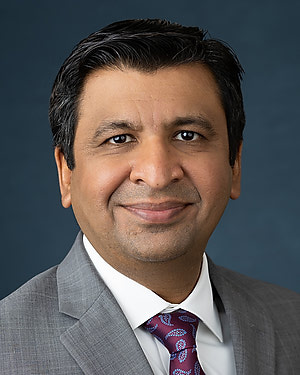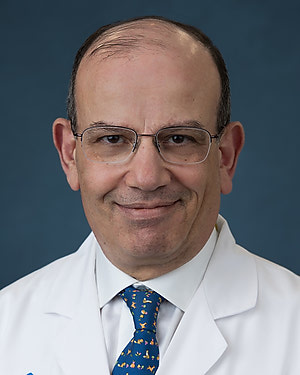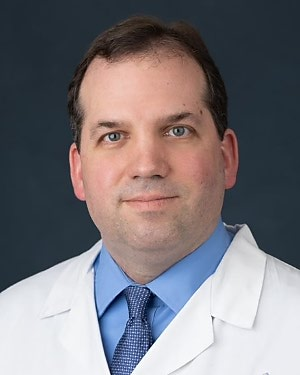Hamid Rabb, MD

- Medical Director of the Johns Hopkins Kidney Transplant Program
Expertise: Nephrology
Primary Location: Johns Hopkins Outpatient Center, Baltimore, MD
Our world-renowned research spans basic, translational, and clinical investigations. With strong collaborations across the Schools of Medicine and Public Health, we meld basic and clinical science to expedite translation of research findings from bench to bedside to community. The overarching goal of the Division is to improve the lives of our patients and community at risk for or affected by kidney disease.
Dr. Rabb’s lab is involved in translational research aimed at understanding the molecular pathogenesis of kidney ischemia/reperfusion injury. The lab is interested in the development of novel treatments for kidney IRI.

Expertise: Nephrology
Primary Location: Johns Hopkins Outpatient Center, Baltimore, MD
Dr. Paul A. Welling and his research team explore the genetic and molecular underpinnings of electrolyte physiology, potassium balance disorders, hypertension and kidney disease. A major thrust of current research activity is devoted to understanding how faulty genes and environmental stresses drive hypertension. The research is providing new insights into how the Western diet triggers deleterious responses of salt-sensitivity genes. The Welling laboratory employs a multidisciplinary approach, spanning from gene discovery, molecular biology, genetically engineered mouse models to translational studies in humans. By illuminating pathophysiological mechanisms and translating the discoveries to develop more effective diagnostic and therapeutic strategies, Welling’s group is striving to improve the health of at-risk individuals and patients with kidney disease and hypertension.
Dr. Welling is the Joseph S. and Esther Hander Professor of Laboratory Research in Nephrology. He has been continuously funded by the National Institutes of Health for over 25 years. Currently he serves as Coordinator of a Global Research Network, funded by the LeDucq Foundation. More about his research can be found here:
Dr. Sperati’s group focuses on complement mediated kidney disorders, glomerular disease, and renal arterial disease secondary to fibromuscular dysplasia. His team has a particular interest in thrombotic microangiopathies involving the complement system.

Expertise: Nephrology
Primary Location: Johns Hopkins Outpatient Center, Baltimore, MD
Dr. Parikh's research focuses on the translation and validation of novel biomarkers for the diagnosis and prognosis of acute kidney injury. Progress in kidney diseases has been hamstrung by significant heterogeneity within the current disease definitions, which are largely based on serum creatinine. Dr. Parikh's research has addressed this critical challenge by developing biomarkers of renal tubular injury, repair, and inflammation to dissect this heterogeneity. He has assembled multicenter longitudinal prospective cohorts for translational research studies across several clinical settings of acute kidney injury and chronic kidney disease for the efficient translation of novel biomarkers.
His research is dedicated to the process of applying discoveries generated in the laboratory and in preclinical experiments, the development of clinical studies, and the design of clinical trials. Dr. Parikh's studies have refined the clinical definition in perioperative acute kidney in...jury and hepatorenal syndrome, developed strategies to reduce kidney discard in deceased donor transplantation, and advanced regulatory approvals of kidney injury biomarkers. He has also developed biomarkers to identify rapid progressors of early diabetic kidney disease before derangements in serum creatinine. Dr. Parikh's research goal is to translate our understanding of pathophysiological mechanisms into clinical practice and improve the outcomes in patients with kidney disease.
Dr. Parikh has also been the recipient of numerous honors, including the 2017 Young Investigator Award from the American Society of Nephrology.
view more

Expertise: Nephrology
Primary Location: The Johns Hopkins Hospital, Baltimore, MD
Dr. Crews’ team focuses on health disparities in chronic kidney disease. We have studied how social determinants of health, such as poverty and healthful food access, affect disparities in kidney disease outcomes. Our research on end-stage renal disease includes studies of the best timing and environment to initiate dialysis among vulnerable populations.

Expertise: Nephrology
Primary Location: The Johns Hopkins Hospital, Baltimore, MD
Dr. Geetha’s team focuses on renal diseases in patients with systemic vasculitis as well as BK virus nephropathy in patients who have undergone renal transplant. Our studies include clinical trials on the effectiveness of rituximab versus cyclosporine in treating idiopathic membranous nephropathy and a multinational study of belimumab with azathioprine for maintaining remission of granulomatosis with polyangiitis and microscopic polyangiitis. We also have conducted research on the treatment of ANCA vasculitis, particularly in kidney transplant patients.

Expertise: Nephrology
Primary Location: Johns Hopkins Bayview Medical Center, Baltimore, MD
Dr. Kraus’ team investigates the factors that impact the long-term success or failure of kidney transplants as well as barriers to nephrology care and transplants in minority populations. We research many topics dealing with kidney transplant rejection, including diagnostic criteria, infection risk and incompatibility factors. Our lab also has a longstanding interest in pancreas transplants and has conducted research to establish guidelines for diagnosing antibody-mediated rejection of pancreas allografts-updated Banff grading schema.
Dr. Atta and his research team explore the epidemiological and clinical interventions of a variety of kidney diseases. Our goal is not only to advance the understanding of many kidney diseases but also to capitalize on novel discoveries of basic science to treat a wide range of rare and common kidney disorders.
Multi-international observational study of a rare form of amyloid (LECT2 amyloid) to understand its natural history with the ultimate interest of treating this condition.
Our group has launched a project investigating the impact of COVID19 on the kidney to identify risk factors influencing outcome across different clinical phenotypes.
In collaboration with the Division of Infectious Diseases and the School of Public Health, our research has focused on the epidemiology of HIV and kidney disease. We also study clinical markers and contributing factors in the progression of kidney disease, and the association between kidney disease and heart disease.
Our research group is participating in a multicenter consortium serving as a clinical core site to study the pathogenesis of HIV-associated kidney disease by providing well-characterized clinical specimens and corresponding clinical and laboratory data.

Expertise: Nephrology
Primary Location: Johns Hopkins Outpatient Center, Baltimore, MD
Dr. Alachkar's research focuses on recurrent glomerular diseases post kidney transplantation. In particular, she has been studying recurrent FSGS post kidney transplant in several, partially NIH funded, prospective research projects that focuses on circulating factors associate with recurrent FSGS and new therapies of recurrent FSGS; in addition to the outcome of the disease. Also, Dr. Alachkar is the Chair of Banff recurrent GN working group that focus on the pathological changes of recurrent GN.
Dr. Alachkar's other research focus is incompatible living and diseases donor transplant. She has several ongoing research studies that focus on AMR and the outcome of patients with positive donor specific antibodies.

Expertise: Nephrology
Primary Location: The Johns Hopkins Hospital, Baltimore, MD
Dr. Sozio’s research focuses on 1) Clinical research related to chronic kidney disease and end stage renal disease, and 2) Educational research in undergraduate and graduate medical education.
The Sozio lab pursues work related to stroke, cognitive impairment, manifestations of kidney disease, and systematic reviews on clinical topics, and collaborates on multiple projects with other key investigators. In particular, Dr. Sozio has been an active investigator in the Choices for Healthy Outcomes in Caring for ESRD (CHOICE) Study, Predictors of Arrhythmic and Cardiovascular Risk in End Stage Renal Disease (PACE) Study, Chronic Renal Insufficiency Cohort (CRIC) Study, and work funded through the Agency for Healthcare Research and Quality (AHRQ) and Johns Hopkins Evidence-Based Practice Center. In addition, the Sozio lab performs studies at the UME and GME levels, investing in understanding learners’ mentorship, research, and transitional experiences.

Expertise: Nephrology
Primary Location: The Johns Hopkins Hospital, Baltimore, MD
Dr. Menez and his laboratory are interested in clinical and translational acute kidney injury (AKI) research, specifically with a focus on the transition between AKI and chronic kidney disease (CKD). Dr. Menez has investigated novel approaches to evaluate AKI using biomarkers of kidney injury, inflammation, and repair in the multi-center TRIBE-AKI and ASSESS-AKI Studies. Dr. Menez collaborates nationwide through the NIDDK-sponsored Kidney Precision Medicine Project, with a goal to improve the global understanding of kidney disease subgroups and identify new pathways and targets for novel therapies.
Since the start of the COVID-19 pandemic, he has additionally investigated the impact of COVID19 on kidney health, including short-term outcomes including need for dialysis or in-hospital mortality, as well as longer-term outcomes post-hospital discharge.
Research Areas: acute kidney injury, chronic kidney disease

Expertise: Nephrology
Primary Location: Johns Hopkins Community Physicians - Johns Hopkins Health Care & Surgery Center, White Marsh, Nottingham, MD